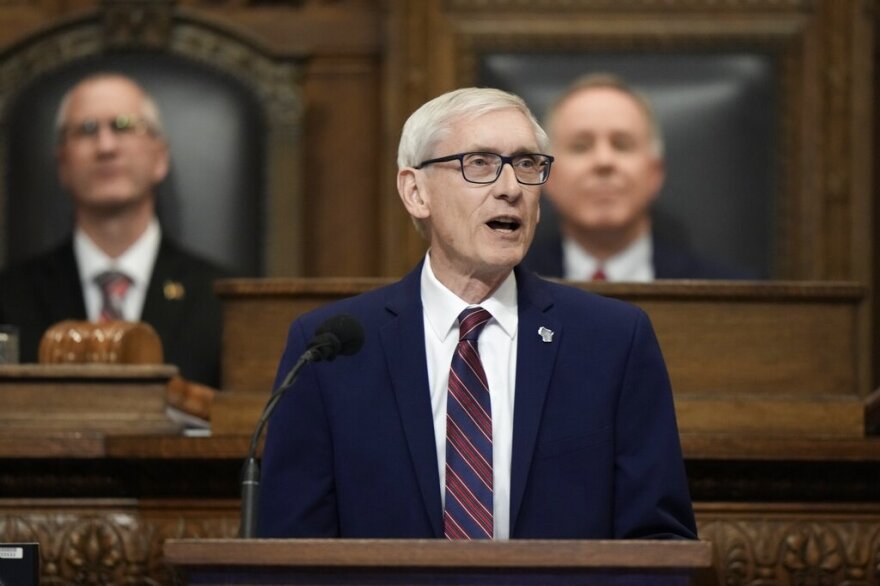Republican Legislative leaders and Gov. Tony Evers (D) have reached a tentative deal on shared revenue to help local governments. The agreement also boosts funding to help both public and voucher schools. But parts of the plan are potentially controversial.

Republicans had threatened to take shared revenue help for Milwaukee and Milwaukee County out of a funding package unless they reached a deal with Gov. Evers this week. Now, there is an agreement that Evers' office says would give local governments across Wisconsin at least 20% more of the state aid, and make it easier for the city of Milwaukee and Milwaukee County to create or raise sales taxes to provide even more revenue.
Instead of making voters pass the tax increases in a referendum or requiring a unanimous vote by the Milwaukee Common Council and County Board, those two local legislative bodies would only need to pass the tax hikes by a 2/3 majority.
One of the state representatives who helped craft the deal, Tony Kurtz (R-Wonewoc) says with a new city sales tax of 2%, Milwaukee could raise $184 million per year. Milwaukee County raising the current half-cent sales tax by 0.4% — up slightly from earlier GOP promises — would generate $76 million per year.
But Kurtz says there's a catch—several of them.
"These funds must — and I cannot emphasize the word must — go to address their unfunded pension liability, and to maintain and grow their law enforcement, fire protection and their emergency services. Once again, public safety, folks," Kurtz says.
The deal with the Evers also includes big increases in education funding for both K-12 public schools and taxpayer-funded voucher schools. Assembly Speaker Robin Vos (R-Racine County) who recently vowed not to drop requirements that the sales tax increases in Milwaukee be passed by voters, acknowledges he's been swayed by the school choice money.

"Yeah, well, sometimes the offer and opportunity to get wins in things you believe in are so good that you have to change your mind. If we would not have the opportunity to have this historic investment in school choice, I probably would have been a no. Under the estimates from the school choice folks, we're looking at an estimate of a 40 percent increase in the number of kids who'll be able to be in a choice school. That's a huge win for parents all across the state," Vos says.
The proposed compromise between GOP leaders and Evers also contains other things that many in Milwaukee may not like. For example, Rep. Barb Dittrich (R-Oconomowoc) highlights forcing MPS to allow police to serve as school resource officers in 25 schools.
"And frankly, these (school resource officers) create relationships with the kids. This is what it's about. So you don't have a street officer who doesn't know the kids charging in, in an emergency, and maybe not handling the situation at an optimal level," Dittrich asserts.
A couple years ago, some teachers convinced the MPS School Board to cancel a resource officer contract with the police department saying schools already have enough security measures.
Other controversial parts of the compromise announced would weaken Milwaukee's citizen-run Fire and Police Commission and make it harder to extend the Milwaukee Streetcar.
But Evers calls the shared revenue increase "historic." Milwaukee County Executive David Crowley says he's grateful to both the Governor and Legislative leaders.

Other reaction from Democrats is more cautious. Milwaukee Mayor Cavalier Johnson is generally supportive, saying he appreciates the hard work that has gone into the legislation, but that "there are aspects he strongly objects to." Milwaukee Common Council President Jose Perez says he looks forward to examining the final details of the compromise agreement.
State Assembly Minority Leader Greta Neubauer (D-Racine) and State Senate Minority Leader Melissa Agard (D-Madison) say, “Every community in Wisconsin is impacted differently by this proposal. For some, this is progress. For others, it doesn’t cut the mustard."
The full legislature still has to vote on the agreement.
Editor's Note: Legislative audio for this story is from Wisconsin Eye.


